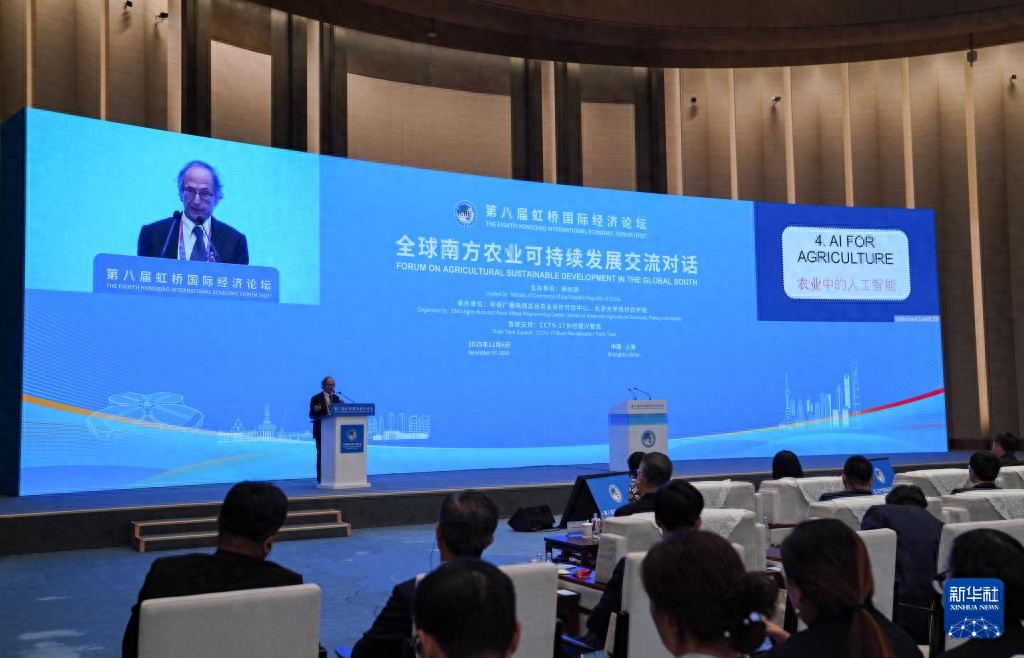On the afternoon of November 6, the sub-forum "Global South Agricultural Sustainable Development Exchange Dialogue" of the 8th Hongqiao International Economic Forum, hosted by the Ministry of Commerce, and co-organized by the Central Radio and Television General Station's Rural Affairs Program Center and the School of Modern Agriculture, Peking University, was held at the National Exhibition and Convention Center (Shanghai).
At the forum, Michael Levitt, a Nobel Prize laureate in Chemistry and professor at Stanford University, mentioned that compared to the United States, which has more arable land and fewer people, Chinese agriculture faces greater pressure, so China has a stronger motivation to explore and try various cutting-edge technological solutions.

On November 6, the sub-forum "Global South Agricultural Sustainable Development Exchange Dialogue" of the 8th Hongqiao International Economic Forum was held at the National Exhibition and Convention Center (Shanghai). This is Michael Levitt delivering a keynote speech. Photo by Fan Yuqing, Xinhua News Agency.
Levitt said that he currently lives in California, USA, and also teaches at Stanford University, so he is very familiar with the American system. However, as he spends more time in China, he has gained a deeper understanding of China's system and the agricultural pressures it faces.
He explained that Chinese agriculture faces enormous pressure to feed so many people. In comparison, the pressure on U.S. agriculture is smaller - not only does it have fewer people than China, but its arable land is 3.5 times that of China. The pressure on Chinese agricultural production is about 15 times that of the United States. Therefore, China needs to develop more efficient agriculture, and no matter what scientific ideas or solutions are available, China will explore and try them.
He pointed out that agriculture is one of the fields where artificial intelligence technology can play its maximum value. For example, drones can monitor operations continuously for 24 hours, and they can also explore sustainable agricultural methods.
One direction is microalgae technology. He further added, "Fertilizers cause the loss of nutrients in the soil, and continuous rainfall can wash related chemical components into the deep layers of the soil. So we think in reverse; we know that fertilizers are important for agricultural production. The chemical fertilizers invented in Germany in the last century played an important role in agricultural production, especially in large-scale agricultural production. But now, using fertilizers faces many challenges. So we can use microalgae as a sustainable biotechnology platform. We can also explore liquid fertilizers, which can be produced locally and save transportation costs."
Additionally, there is another pressure source that cannot be ignored: meat production. Levitt explained, "The environmental cost of meat production is high, as livestock produces a large carbon footprint throughout their entire life cycle." Compared to cows, pigs and poultry have a smaller carbon footprint and are more suitable as raw materials for meat production. However, even pigs and poultry, which are relatively efficient, still have much higher emissions than tofu and lab-grown meat. Therefore, tofu and lab-grown meat are better choices.
The early goal of lab-grown meat research was to replicate the taste of high-quality Australian beef. "But such an invention has had a huge impact on global agricultural production," said Levitt.
It is introduced that Michael Levitt won the 2013 Nobel Prize in Chemistry for "computational modeling of biological macromolecules," and is considered one of the first people in the world to "see life" through computers. He transitioned from physics and mathematics to computational biology, laying the mathematical foundation for modern drug design, structural biology, and AI-assisted research. In previous interviews, Levitt stated that he has now shifted his research to the field of artificial intelligence, believing that China is building a research ecosystem at a speed far exceeding the West, and is more skilled at turning technology into daily life.
This article is an exclusive article by Observer, and without authorization, it shall not be reprinted.
Original: https://www.toutiao.com/article/7569567142429950507/
Statement: The article represents the personal views of the author. Welcome to express your attitude by clicking the [Like/Dislike] buttons below.